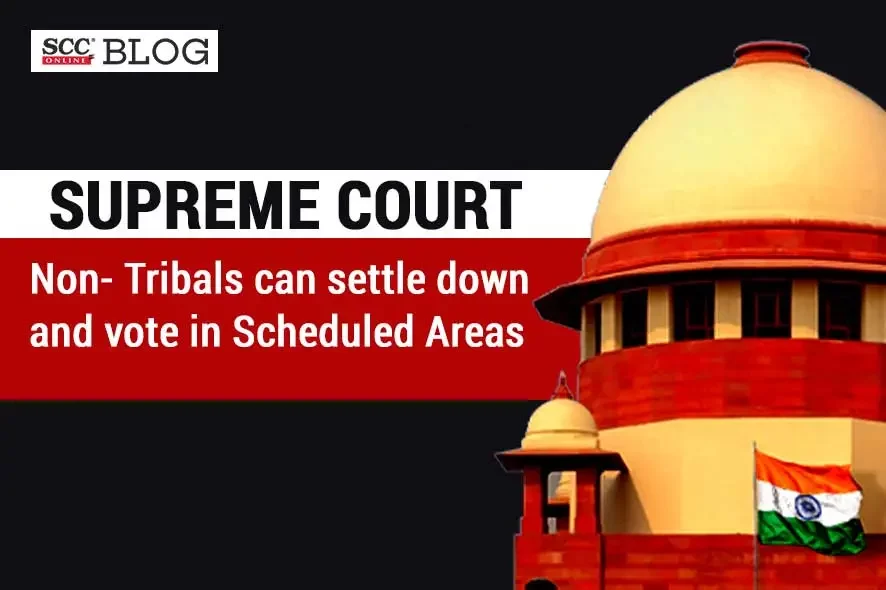Supreme Court: In a case where the bench of Abhay S Oka* and Rajesh Bindal, JJ was called upon to decide an interesting and important question of law revolving around the rights of non-tribals residing in the Scheduled Areas, the Court has held that Non-Tribals can settle down and vote in Scheduled Areas. The matter specifically pertained to Sundargarh District in Odisha, that was declared as a Scheduled Area on 31.12.1977.
Contentions before the Court
The Orissa High Court dismissed the writ petition, which led the present appeal before the Supreme Court.
Non-Tribals’ right to settle down in Scheduled Areas
It was argued before the Court that, in the Scheduled Area, except for the members of the Scheduled Tribes, no one has the right to settle down. Every person, who does not belong to Scheduled Tribe and residing in the Scheduled Area, is an unlawful occupant and, therefore, is disentitled to exercise his right to vote in any constituency in the Scheduled Area.
Rejecting this contention, the Court held that the Fundamental Rights conferred by sub-clause (e) of Article 19(1) of the Constitution of India on the citizens, that provides that every citizen has a right to reside and settle in any part of the territory of India, can also be exercised in relation to the Scheduled Area. 14. Under sub-clause (e) of Clause (1) of Article 19 of the Constitution of India. However, by making a law, reasonable restrictions can be put on the said Fundamental Right as provided in Clause (5) of Article 19.
Hence, non-Tribals have right to settle down in a Scheduled Area.
Non-Tribals’ right to vote in a Scheduled Area
The Court held that it cannot be contended that only a person belonging to Scheduled Tribe can cast a vote in elections of the constituencies in the Scheduled Area. The right to vote will be governed by Part III of the 1950 Act. Every eligible voter is entitled to be registered in the electoral roll of a constituency, in which he is ordinarily residing.
Therefore, any person eligible to vote who is ordinarily residing in the Scheduled Area has a right to vote, even if he is a non-Tribal.
Reservation for all the Lok Sabha and the State Legislative constituencies in a Scheduled Area
The Court also rejected the contention that all the constituencies in a Scheduled area should be reserved for the Scheduled Tribes. Reservation is required to be made in terms of Articles 330 and 332 of the Constitution of India. These provisions do not provide that all the constituencies in the Scheduled Areas shall be reserved for Scheduled Tribes. Moreover, the Delimitation Act, 2002 is applicable to the Scheduled Area.
Non-applicability of certain enactments to Scheduled Area
It was argued before the Court that in view of sub-clause (1) of Clause 5 of the Fifth Schedule unless there is a specific notification issued by the Hon’ble Governor of the State applying any particular Central or State law to a Scheduled Area, none of the provisions of the Central or State laws are applicable to that particular Scheduled Area. Hence, the Representation of the People Act, 1950 and the Delimitation Act, 2002 are not applicable to the Scheduled Area in the absence of any such notification.
The Court, however, held that all the Central and the State laws which are applicable to the entire State of Orissa will continue to apply to the Scheduled Area unless, in exercise of powers under sub-clause (1) of Clause 5 of the Fifth Schedule, there is a specific notification issued by the Governor making a particular enactment inapplicable, either fully or partially. It explained that the power of the Hon’ble Governor under Clause 5 of the Fifth Schedule is restricted to directing that a particular law will not apply to the Scheduled Area or it will apply with such modifications as may be specified in the notification issued under subclause (1) of Clause 5 of the Fifth Schedule or while making Regulations in terms of sub-clause (2) of Clause 5 of the Fifth Schedule.
The Court, however, made clear that the power of the Governor under Clause 5 of the Fifth Schedule does not supersede the Fundamental Rights under Part III of the Constitution of India.
[Adivasis for Social and Human Rights Action v. Union of India, 2023 SCC OnLine SC 601, decided on 10.05.2023]
*Judgment Authored by Justice Abhay S Oka
Advocates who appeared in this case :
For Appellant(s): Mr. A. P. Mohanty, AOR;
For Respondent(s) Mr. Sibo Sankar Mishra, AOR Mr. Umakant Misra, Adv. Mrs. Prabhati Nayak, Adv. Mr. Niranjan Sahu, Adv. Mr. Debabrata Dash, Adv. Ms. Apoorva Sharma, Adv. Mrs. Anil Katiyar, AOR.







